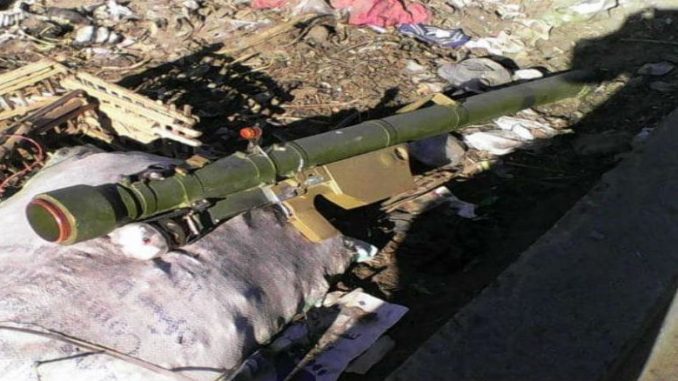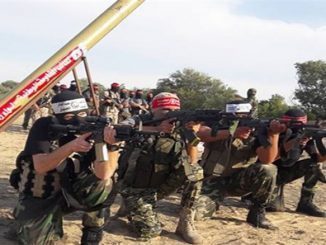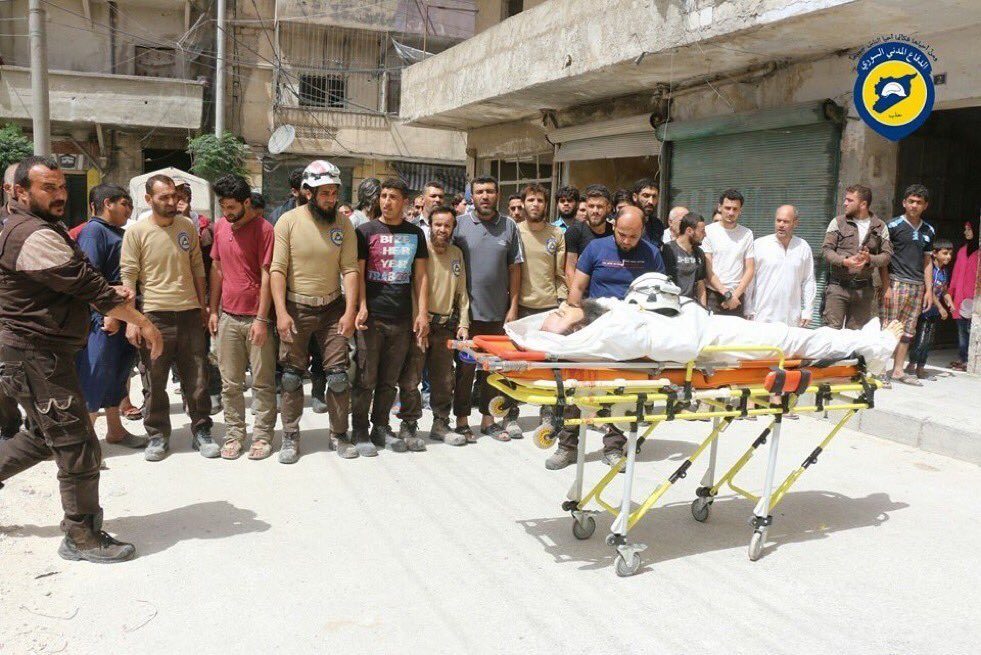
A shoulder-fired anti-aircraft missile launcher lying in a heap of rubbish next to Cairo’s main international airport was allegedly found by an Egyptian man, according to The Telegraph.
Ibrahim Yousry, an Egyptian, said that he found an SA-7 missile launcher on the side of the road around a mile north of Cairo International Airport as he was heading to work.
He said that he struggled at first to get police to believe him about finding the weapon.
In fact, the weapon has a maximum range of around 2.5 miles and so it could be used at that distance to strike a plane as it landed or took off.
On Facebook, Mr. Yousry wrote that he was at first afraid to report the launcher to police in case they thought that he had something to do with it. However, he decided in the end to inform the police as it was too dangerous to leave the weapon lying around.
He wrote, “The airport is not far away and it could cause disasters if it was placed here for a reason,” he added,“The airplanes here are an easy target because they fly at very low altitude and this is the best position for this weapon to be used.”
The weapon did not appear to be loaded with a missile, according to Mr. Yousry.
He said he struggled to convince two policemen nearby to take him seriously but that they eventually took the launcher and carried it away.
According to the Telegraph,“Mr Yousry did not respond to an effort to contact him. His Facebook post from February 18 began to go viral in Egypt and he eventually deleted it and replaced it with a cryptic note suggesting he was concerned about angering Egypt’s authoritarian government.”
“Fishing in troubled waters is not my style,” he wrote.
In fact, the Egyptian foreign ministry did not respond to a request for comment, said the Telegraph.
Alarming Breach of Security in Egypt
Although the man’s claim could not be verified yet, “but if the weapon is real, it would mark an alarming breach of security in a country that has seen two passenger’s planes explode in the last two years,” said the Telegraph.
According to the British newspaper, “The find is potentially worrying for Britain, which closely monitors airport security across Egypt and is weighing whether to resume tourist flights to Sharm el-Sheikh after a Russian jet was blown up by an Islamic State (ISIS)affiliate in 2015.”
Moreover, discovery came as ISIS released a new video threatening Egypt’s Christian population and describing them as the “favorite prey” of jihadists.
In the new released video, ISIS showed the suicide bomber who killed nearly 30 people when he attacked a church in Cairo in December and the jihadist group promised more attacks against the country’s Christian minority.
A narrator describes Christians as ISIS’s“favorite prey” and says they do not enjoy the status of “dhimmis”, non-Muslims who were traditionally protected inside medieval Islamic empires.”
Instead, Christians are described as “infidels”.One of the jihadists featured in the video,“God gave orders to kill every infidel.”
In this context, the executive director of Conflict Armament Research (CAR), James Bevan examined photographs of the launcher at the request of The Telegraph.
It was impossible to tell if the weapon was real based on a social media photograph but that it looked like an SA-7, a common portable anti-aircraft weapon, according to Mr. Bevan.
SA-7 version is manufactured in Egypt and many such weapons flooded out of neighboring Libya after the fall of the Gaddafi regime in 2011.
It is worth to mention that (CAR) has found SA-7 components in abandoned ISIS bases in Syria and Iraq, which suggested that the group has found a way to access parts of the weapons.
Mr. Bevan said,“If it’s real, it wouldn’t surprise me to find it there given the number of possible sources and the number of actors that potentially have access to a system like this.”
The Telegraph reported,“A battery pack at the front of the weapon looked to have been made of improvised materials.”
It added,“It is impossible to know how the weapon ended up near the airport but the worst fear of Egyptian and Western intelligence is that it was planted by ISIS Egyptian affiliate, (Sinai Province)Wilayat Sinai, to be used in an attack on an aircraft.”
In October 2015, Sinai Province has claimed their responsibility for downing a Russian passenger jet killing all 224 people on board.
Moreover,an Egyptair flight went down over the Mediterranean in May 2016 as it flew from Paris to Cairo, killing 66 people on board. The crash has never been explained, however, the Egyptian authorities claim to have found traces of explosives on the bodies of victims.
Security at Egyptian airports has been reviewed by British aviation experts for years, given the high number of UK tourists who visit the country each year.
After the 2015 explosion, UK halted its flights to Sharm el-Sheikh, but its is currently weighing whether to resume flying, as several other European countries have done.
In the same context, after the Coptic Church bomb in December, the Foreign and Commonwealth Office (FCO) – a department of the government of the United Kingdom responsible for protecting and promoting British interests worldwide – has urged travelers heading to Egypt to be “vigilant” and “follow local advice”following the Coptic Christian attack.
In addition, FCO advised tourists not to travel to the Governorate of North Sinai “due to the significant increase in criminal activity and continued terrorist attacks on police and security forces that have resulted in deaths,” according to the FCO foreign travel advice statement.
The FCO also advised against all but essential travel to the Governorate of South Sinai too. However, this excludes the “area within the Sharm el Sheikh perimeter barrier”.
The FCO included the airport and the areas of Sharm el Maya, Hadaba, Maama Bay, Sharks Bay and Nabq. But said, “We advise against all but essential travel by air to or from Sharm el Sheikh.”
The FCO also advised against all but essential travel to the area west of the Nile Valley and Nile Delta regions – but this excludes the coastal areas between the Nile Delta and Marsa Matruh.
Furthermore, the FCO confirms that the current terror threat in Egypt remains high. It stated, “Terrorists continue to plan and conduct attacks. Further attacks are likely.” It added,“Most terrorist attacks target the security forces, but it’s likely that foreigners, including tourists will also be targeted.”
“Attacks could be indiscriminate and may occur without prior warning. There have been threats to western nationals, institutions and businesses posted n websites and social media,”said FCO.
Will the latest discovery help Egypt revive Tourism?
Egypt strives to restore tourism in the country to revive its wrecked economy. However, the latest discovery will probably have negative repercussions on security conditions in Egypt.
Egypt’s tourism is one of the major sources of foreign currency in the country, that suffers from an economic crisis due to the shortage of foreign currency. The number of tourists fell 40% in the first quarter of 2016.
Tourism revenues have fallen as result of security instability in Egypt after the military coup in 2013 against Egypt’s first democratically elected President Mohamed Morsi.
Last January, Tarek Amer, the governor of the Central Bank of Egypt (CBE) told a parliament’s economic committee that foreign exchange revenues from tourism has declined from $11 billion in 2011 to $3.4 billion in 2016.
Sinai Province, a group affiliated to the Islamic State (ISIS),launched massive attacks against Egypt’s police and armed forces in Sinai as well as targeting foreign planes as the case with the Russian passenger jet in October 2015.
As a result, both the British and Russian governments banned their airlines from traveling to Sharm AL-Sheikh for security concerns which had negative repercussions on tourism in Egypt.
In addition, Egypt received another major blow in May when an Egypt Air plane crashed into the Mediterranean.
Moreover,a bomb blast has killed at least 25 people and injured nearly 49 others during Sunday mass inside a Cairo church near the main Coptic Christian cathedral,last December. Again the Islamic State’s Egyptian branch claimed responsibility for the attacks.
The Egyptian authorities are trying nowadays to mend the aviation activities with Russia . On February 18,2017, the Russian government has approved the aviation safety protocol between the Russian Federation and Egypt, according to the cabinet’s decree signed by Prime Minister Dmitry Medvedev.
However, would the latest discovery affect the security measures supervision of theses countries especially that a SA-7 was used to strike a DHL delivery plane as it took off from Baghdad in 2003.The missile badly damaged the aircraft but the crew were able to make an emergency landing without any injuries.



